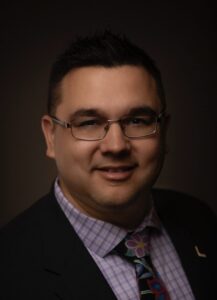Indigenous tourism CEO provides industry information during webinar

By Sam Laskaris
M’CHIGEENG FIRST NATION – Kevin Eshkawkogan offered up information on the past, present and future while speaking at a webinar titled Indigenous Tourism 101.
Eshkawkogan was one of the featured panelists at the webinar, which was held Feb. 25, and hosted by the tourist information centre The Heart of Ontario.
Eshkawkogan, a member of M’Chigeeng First Nation and the CEO of Indigenous Tourism Ontario (ITO), covered various topics during the two-hour webinar.
He began the event by showing a map of the province and discussing why Ontario’s history is relevant when talking about the Indigenous tourism sector.
“It’s important that we understand where people come from and what their history entails when we’re talking about tourism,” he said. ““We can’t just do all the fun stuff. We want to tell our story. And that’s basically why Indigenous Tourism Ontario exists. We’re here to tell our story on our terms.”
Eshkawkogan added it’s only fitting Indigenous people are heavily involved with their own tourism industry, but partners are also required.
“There’s a long story here,” he said. “And there’s really nobody better to be in the tourism industry than Indigenous people. And we’re not saying we want to do this alone. What we are saying though is we need to understand history in the modern context while working alongside good partners who want to do things in a mutual beneficial manner.
“It can’t be one-sided, strictly Indigenous or strictly non-Indigenous. We need to work together and I’m a firm believer in the collective tourism family. And the tourism family looks out for each other, just like any other family would. And that’s what we need to do, include everybody and work together on things.”
Prior to the COVID-19 pandemic, in 2019, there were 558 Indigenous tourism businesses in Ontario. Those businesses were providing almost 13,000 jobs.
Thus, Eshkawkogan said the largest Indigenous tourism industry in Canada is in Ontario. Its industry is larger than those in Quebec and all provinces east combined. It is also larger than all of the territories combined. And it is larger than Alberta, Saskatchewan, and Manitoba combined.
Ontario’s industry is also larger than that of British Columbia, which has the country’s most mature Indigenous tourism industry.
Many of the Indigenous tourism businesses in Ontario; however, have taken major hits during the pandemic. Many of them were reliant on international business but travel dried up significantly once the pandemic began.
As a result, ITO has been trying to assist its members in other ways of creating revenue streams.
A couple of ways of doing that are offering virtual reality (VR) and augmented reality experiences. No travel is required to enjoy these experiences.
“That kind of defeats the purpose of being in tourism,” Eshkawkogan said. “It does. But at the same time, it plays an important part of what we’re trying.”
Eshkawkogan added many Indigenous tourism experiences are limited in how many people can attend in person, but with VR experiences, several hundred can be hosted in an hour or afternoon session.
“Don’t get me wrong,” Eshkawkogan said. “There is no replacement for an in-person experience. Ever. But I know at the same time, Indigenous operators are spread incredibly thin.”
He added work is currently being done on an augmented reality app that maps out Ontario and activates different sites across the province.
With this app, individuals will be able to have statues ‘come to life’ and tell stories about particular regions. Users will also be able to receive notifications when driving and be informed about which territory or First Nation one has entered.
“If we can use technology to help educate people a little bit better on traditional territories, treaty territories, history of the land, we see this thing growing exponentially over time,” Eshkawkogan said.

